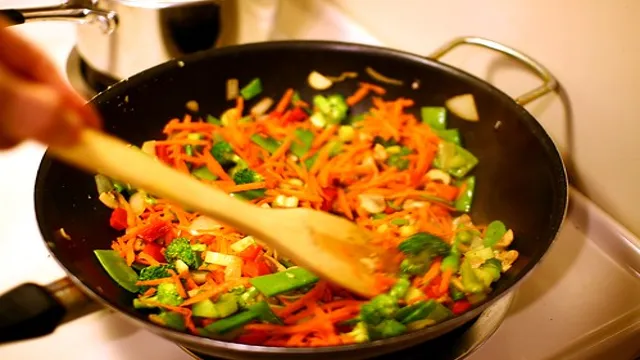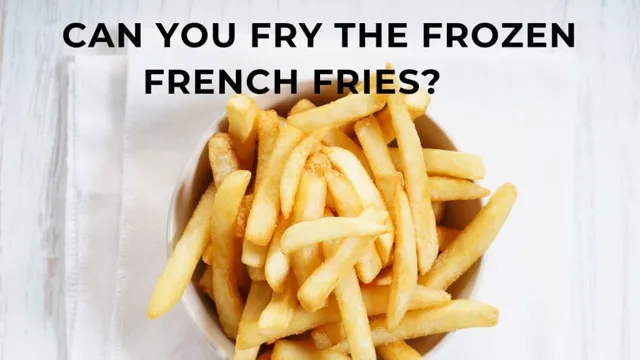Have you ever found yourself starving with only a frozen meal for company? Or perhaps you’ve wanted to cook some frozen chicken tenders for a quick dinner. But can you really fry frozen food? The truth is, it’s not that simple. While some frozen foods can be fried safely, others can be dangerous to cook without first thawing them.
In this blog post, we’ll explore the ins and outs of frying frozen food, the risks involved, and some tips for doing it safely and deliciously. So buckle up and get ready to learn about the potentially slippery slope of frying frozen food.
Understanding the Science Behind Frying
If you’ve ever asked yourself “can you fry frozen food?”, the answer is yes, you can! However, there are a few things to keep in mind when attempting to fry frozen food. First, you’ll need to thaw the food before frying it to ensure that it cooks evenly and thoroughly. This can be done by leaving the food in the refrigerator overnight or by using a microwave to defrost it.
Second, be sure to dry the food thoroughly before adding it to the hot oil to prevent splattering and ensure crispy results. When frying frozen food, it’s important to use the right type of oil that can withstand high temperatures without burning. Vegetable, canola, or peanut oils are good options for frying.
While it’s perfectly okay to fry frozen food, it’s important to take necessary precautions to ensure that it is cooked safely and to perfection.
Breaking Down Water and Oil
When it comes to frying food, it’s important to understand how the properties of oil and water interact with each other. Oil and water don’t mix because they have different chemical structures. Water is polar, meaning it has a partial negative charge on one end and a partial positive charge on the other.
Oil, on the other hand, is nonpolar, meaning it doesn’t have any charged ends. This difference in polarity is why oil and water don’t mix. When you fry food, the oil molecules surround the food, creating a barrier between it and the hot air.
This barrier protects the food from burning. Additionally, oil is a much better conductor of heat than water, which means it transfers heat more efficiently to the food. That’s why fried food is crispy on the outside and juicy on the inside.
Overall, understanding how oil and water interact when frying food is crucial for achieving tasty and perfectly cooked dishes.

Heat and Chemical Reactions
Frying is a popular cooking method that involves heating oil to high temperatures to cook food. In this process, heat is used to initiate chemical reactions that transform the food’s flavor, texture, and color. As the oil heats up, it starts to break down the food’s outer layer and form a crispy coating.
This transformation occurs due to a process called Maillard reaction, where amino acids and reducing sugars react to produce new compounds that give fried foods their distinctive flavors. However, frying can also lead to the formation of harmful compounds like acrylamide and polycyclic aromatic hydrocarbons, which are byproducts of the chemical reactions that occur in hot oil. To minimize the harmful effects of frying, it’s important to use fresh oil and cook food at the appropriate temperatures.
It’s also recommended to choose healthier cooking oils, like olive or avocado oil, which are less likely to produce harmful compounds during frying. By understanding the science behind frying, we can enjoy delicious fried foods while also taking care of our health.
Frozen Food and Frying
When it comes to frying frozen food, the question on many people’s minds is whether or not it’s even possible. The answer? It depends on the type of food you’re cooking. For example, frozen french fries can be successfully fried, while attempting to fry other types of frozen foods may result in a dangerous situation, such as oil popping or a fire.
To fry frozen foods safely and effectively, it’s important to thaw them properly before cooking. Additionally, it’s essential to use a deep fryer with a temperature control setting to avoid overheating the oil. Overall, yes, you can fry some types of frozen food, but it requires caution and care to do so safely.
The Risks of Frying Frozen Food
Frying frozen food comes with its own set of risks that can cause harm to both the food and the person cooking it. When frozen food is dropped into hot oil, it can cause the oil to splatter and potentially burn the cook. Furthermore, the moisture content in frozen food can cause the oil to bubble and overflow, which can lead to dangerous fires.
Additionally, frying frozen food can result in an uneven cook, where the exterior is overcooked and the interior remains frozen, resulting in an unappetizing texture. To avoid these risks, it’s important to properly thaw frozen food before frying and to ensure that the oil is at the appropriate temperature. Taking these precautions can help you safely enjoy your favorite fried foods without any incidents.
How to Safely Fry Frozen Food
Frozen food can be a great convenience when you’re in a hurry to prepare a meal. But what happens when you want to fry frozen food? Is it safe? Well, the answer is yes, but you need to take some precautions. First off, make sure your frozen food is completely thawed before attempting to fry it.
This is because ice crystals can cause oil to splatter and potentially burn you. Additionally, be cautious when adding the thawed food to the hot oil as it can cause it to bubble up and overflow the pot. To prevent this, only add a few pieces at a time.
Lastly, make sure to monitor the temperature of the oil, as frozen food can lower the temperature, resulting in soggy and undercooked food. Overall, as long as you take the necessary precautions, frying frozen food can be safe and delicious.
Choosing the Right Oil and Temperature
Choosing the right oil and temperature is crucial when it comes to frying frozen foods. It’s important to select an oil that has a high smoke point, such as canola or peanut oil, to prevent the oil from breaking down and producing harmful compounds. The oil should also have a neutral flavor, so it doesn’t affect the taste of the food.
In terms of temperature, it’s recommended to use a thermometer to ensure the oil is at the optimal frying temperature. Most frozen foods can be fried at around 350-375°F. If the oil temperature is too low, the food will absorb too much oil and become greasy, while if the temperature is too high, the food may burn on the outside while remaining frozen on the inside.
So, it’s important to find the sweet spot for the perfect fried frozen food. Don’t be afraid to experiment with different oils and temperatures to find the right combination that works for you.
Tips for Perfectly Fried Frozen Food
Can you fry frozen food? Yes, you can! In fact, frying frozen food is an easy and delicious way to enjoy your favorite treats. However, there are a few tips and tricks to ensure that your fried frozen food turns out perfectly. First, make sure that you properly thaw the food before frying it – this will prevent any excess moisture from causing the oil to splatter.
Next, use a high-quality oil with a high smoke point, such as vegetable or canola oil. It’s also important to preheat the oil to the correct temperature – typically around 375°F. Finally, don’t overcrowd the frying pan or fryer – this can cause the temperature of the oil to drop and result in unevenly cooked food.
With these tips in mind, you can enjoy delicious and crispy fried frozen food right from your own kitchen.
Choosing the Right Frozen Food
When it comes to choosing frozen food to fry, it can be overwhelming with so many options available. However, there are a few tips to keep in mind to ensure you’re picking the best option for perfectly fried food. First, look for frozen food products that are specifically labeled as “deep fry” or “fryer friendly”.
These products are usually coated or battered specifically for deep frying and will give you the best results. Secondly, make sure the frozen food is not freezer burned or expired. This can negatively affect the texture and flavor of the fried food.
Lastly, consider the size and shape of the frozen food. Avoid excessively large pieces as they may not cook evenly and lead to undercooked or overcooked portions. Opt for medium-sized pieces or slices for the perfect fried dish.
By keeping these tips in mind, you’ll be able to choose the right frozen food for your next deep frying adventure and achieve that crispy, golden perfection you desire.
Prepping Your Food for Frying
When it comes to frying frozen food, preparation is key to achieving perfectly crispy and delicious results. Start by thawing the food completely and patting it dry with paper towels. Removing excess moisture is important to prevent splatters and ensure even cooking.
Next, dredge the food in a mixture of flour, cornstarch, or breadcrumbs, depending on the recipe. This coating not only adds flavor and crunch but also helps to protect the food from absorbing too much oil. When frying, make sure the oil is hot enough (around 375°F) to quickly seal the coating and prevent oil saturation.
Don’t overcrowd the frying pan or deep fryer, as this can cause the temperature to drop and result in uneven cooking. Remember to drain the fried food on a paper towel-lined plate and season it with salt and any other desired seasonings while it’s still hot. With these tips, you’ll be on your way to enjoying perfectly fried frozen food in no time!
Conclusion: Fried and Frozen
In conclusion, while some may argue that frying frozen food is a risky and potentially dangerous endeavor, it is possible with the proper precautions and techniques. It may take a bit of extra effort to thaw and properly prepare frozen foods for frying, but with patience and a little creativity, you can enjoy your favorite frozen delicacies in golden, crispy perfection.”
FAQs
Can you fry frozen chicken nuggets?
Yes, you can fry frozen chicken nuggets. However, it is recommended to thaw them first to ensure even cooking.
Can you fry frozen french fries?
Yes, you can fry frozen french fries. In fact, frying frozen fries can result in a crispier texture. It is important to preheat the oil to avoid sticking.
Can you fry frozen shrimp?
Yes, you can fry frozen shrimp. It is recommended to thaw them first to ensure even cooking. Coat them with flour or breadcrumbs before frying for a crispy texture.
Can you fry frozen vegetables?
Yes, you can fry frozen vegetables. They will thaw and cook quickly in the hot oil. However, it is recommended to pat them dry before frying to avoid splattering.
